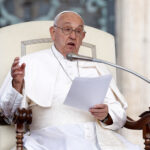Opinion polls suggest MK will get about 10% of the vote. It is expected to do especially well in his home province of KwaZulu-Natal, where tensions have been high, with some incidents of violence reported during the campaign.
“The election in KwaZulu-Natal could become very messy – expect a lot of disputes and contestation over the results,” Prof Calland said.
Women make up 55% of registered voters – around 15 million, according to statistics released by the Electoral Commission.
In terms of age group, voter registration is highest among those who are 30 to 39 years old. They make up almost seven million of the 26.7 million voters.
But, said, Prof Calland, around 13.7 million eligible voters did not register, with most of them – eight million – below the age of 30.
“They have turned their backs on our young democracy. The assumption is that they have lost hope, feeling economically excluded and seeing no viable opposition,” he added.
This view was borne out by 29-year-old Keabetswe Maleka, who lives in Soweto, which was the epicenter of a student uprising against apartheid in 1976.
In an interview with BBC Africa Daily podcast presenter Mpho Lakaje, he said he would not be voting because of bad public services, and because he is unemployed.
“I’m looking for a job. Nothing is happening,” he said.
Another Soweto resident, Mawela Rezant, 66, said he would be voting in the hope that the next government would tackle unemployment and crime.
“I’m hoping to see our economy grow. I’m hoping to see the police out in full force,” he added.
Police and the army have been deployed to polling stations across the country to ensure that voting takes place peacefully, and that ballot papers are not stolen.



